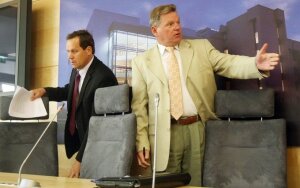- August 1, 2012
- 422
Lentvaris incorporated into Vilnius? For Electoral Action of Poles in Lithuania (AWPL) it is a political decision

Members of the Seimas will consider a proposal to incorporate Lentvaris, which currently is a part of the Trakai district municipality, to Vilnius. The project, which aims at changing boundaries of the administrative units, was registered in the office of the Seimas of Lithuania by conservatist Paulius Saudargas.
The MP thinks that the idea will help to solve social and economic problems Lentvaris deals with.
“It will make it possible to integrate Lentvaris with Vilnius public transport and as a result, to lower travelling costs. Another advantage will be a possibility to use Vilnius water supply and sewage systems. Thanks to that, people will pay less for drinking water or channelling sewage. Incomes of Vilnius will increase because it will get more money from taxes paid by inhabitants of Lentvaris (income tax, property tax, etc.). If local authorities manage Vilnius finances in a sensible and effective way, some money can be spend on improving and developing the infrastructure of Lentvaris. It will mean better conditions and also a possibility of attracting to the town investors both home and abroad” – says Saudargas.
Saudargas thinks that after incorporating Lentvaris into Vilnius and increasing funding from the local budget of Vilnius, it will be possible to introduce suitable security measures in order to ensure cooperation between police and local government in the field of order and public safety. It could have a positive influence on reducing the crime rate.
Saudargas says that what motivated him to prepare this type of project were aspirations of the inhabitants of Lentvaris to incorporate their town into the capital.
The MP claims that in 2002, one collected over 3000 signatures of the inhabitants of Lentvaris (it is about one fourth of its inhabitants) in favour of incorporating the town to Vilnius. On September 18, 2002 Vilnius city municipality council (Vilniaus miesto savivaldybės taryba) supported the project, however, the local government of the Trakai district municipality opposed to it.
According to data presented by Saudargas, over 80% of all the inhabitants of Lentvaris works in Vilnius, however, income tax they pay goes to the local government of the Trakai district municipality.
“At the same time the local government, does not show enough consideration for Lentvaris when planning out expenditure. For over ten years its streets or pavements have not been repaired and public safety has not been on a satisfactory level. One can observe there a high crime rate, alcoholism and drug addiction. However, the biggest problem is utility service. Currently, for drinking water and channelling sewage inhabitants of Lentvaris pay one of the highest prices in the country – up to 7,52 LTL for one cubic metre. Those who live in Vilnius pay only 4,37 LTL. The price of drinking water is of course influenced by the costs of delivery, number of customers or not modernized infrastructure. And the local government of the Trakai district municipality does not care too much about that. In other words, in the Trakai district municipality Lentvaris is treated as a second-class town” – said Saudargas.
AWPL: It is a political decision.
According to Leonard Talmont – an MP from Electoral Action of Poles in Lithuania – incorporating Lentvaris into Vilnius hits at national minorities in Lithuania, including Poles who form a substantial proportion of all the inhabitants of Lentvaris. “As a party, we haven’t discussed it yet but it is obvious that the project will make the Trakai district municipality smaller. Only Trakai and its surroundings will be left in it. As far as I know, Poles and Russians live mainly in Lentvaris and Połuknie. The part of the district which is to be left is inhabited mostly by Lithuanians” – said Leonard Talmont.
In Talmont’s opinion it is a continuation of the government’s policy aiming at weakening the position of national minorities. It was like that when two neighbourhoods were excluded from the Širvintos-Vilnius district municipalities constituency. In those two places Poles constituted the majority and they were incorporated into the “Lithuanian” Širvintos -Molėtai district municipality constituency.
“We are nor against changes. But they cannot be merely cosmetic but substantive. All constituencies in Lithuania should have 35 000 voters. And changes manipulating the number are introduced only in Vilnius district. It is done to weaken the position of national minorities. If the division into constituencies was normal, then AWPL would have six members of parliament in single-member constituencies” – explains Leonard Talmont.
Jarosław Narkiewicz, who was elected member of the Seimas in the Vilnius-Trakai district municipalities constituency and for several years had been a councilman in the Trakai district municipality, thinks in a similar way. “Seven years ago the local government of the Trakai district municipality adopted a special plan supporting offices of starosts in the region, including Lentvaris. Of course not everything, but still a lot of points of the plan have been realized” – said Narkiewicz. The MP informed that a school and a kindergarten (also Lithuanian) in Lentvaris were repaired and streets were renewed. Also projects concerning sewage were realized and Lentvaris is soon supposed have a modern water supply system.
“I think seven years ago there was a referendum held among inhabitants of Lentvaris concerning incorporating it into Vilnius. The people shown little interest for the plebiscite. It is not relevant anymore. One cannot forget that incorporating Lentvaris into Vilnius will not automatically solve all the problems. A good example is Grigiškės – a province of Vilnius” – said Jarosław Narkiewicz. In his opinion, inhabitants of Lentvaris have a good transport connection between Vilnius and their town.
Source: http://pl.delfi.lt/aktualia/litwa/landwarow-chca-przylaczyc-do-wilna.d?id=59226225
Tłumaczenie Dorota Małgorzata Mitoraj w ramach praktyk w Europejskiej Fundacji Praw Człowieka, www.efhr.eu. Translated by Małgorzata Mitoraj within the framework of a traineeship programme of the European Foundation of Human Rights, www.efhr.eu.

